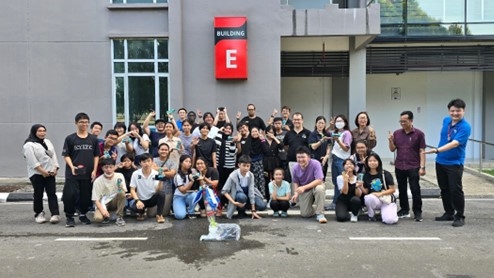KUCHING – The IoT4Community project, led by the IEEE Swinburne Sarawak Student Branch and IEEE Sarawak Subsection, successfully concluded its latest instalment of the “Shooting Satellites” workshop at Swinburne Kuching campus recently. With over 30 secondary school students and teachers participating, the event underscored the university’s commitment to advancing hands-on STEM education by incorporating the Internet of Things (IoT) in a practical, engaging, and innovative way.
The event, organised in collaboration with the Swinburne Robotics and Automation Club, the Swinburne Computer Science Club, and Malaysia Board of Technologist (MBOT) Student Chapter, provided participants with a unique opportunity to explore IoT technologies by creating miniature satellites, or ‘can-satellites’. The participants, grouped into a team of three, were assigned roles and given the challenge of building and launching their satellites in under two hours.
The peak of the workshop saw these satellites launched using an IoT-enabled remote launcher. Participants gave highly positive feedback, praising the teamwork and hands-on learning that effectively introduced them to IoT. The interactive nature of the event also helped participants developed their skills in technology, engineering, and problem-solving.
The IoT4Community project extended its reach earlier this year when Dr Mark Tee Kit Tsun, Advisor, IEEE Swinburne Sarawak Student Branch and Paul Cornelius Bong, its chairman, conducted a similar workshop at the Southeast Asian Ministers of Education Organisation, regional Centre for Education in Science and Mathematics (SEAMEO RECSAM) in Penang. Held in June as part of the 13th Regional Congress Search for SEAMEO Young Scientists, the workshop attracted 60 participants across Southeast Asia. Like the Sarawak workshop, the attendees were engaged in building and launching IoT-powered can satellites where they worked in a collaborative and dynamic environment.
The workshops highlighted how complex technological concepts can be simplified through innovative practical learning. The workshops inspired the participants on the true potential of IoT in solving real-world problem using innovation. It also paved the way for new exploration in engineering and computer science.
Since its establishment in 2021, the IoT4Community project, under the leadership of Dr Mark Tee Kit Tsun, has gained momentum as a premier platform for introducing IoT to young learners and educators. With plans already underway for next year’s workshop, the IoT4Community team aims to bring new and exciting challenges centred around the collaborative teleoperation of IoT-powered battleships.
According to Dr Tee, “IoT is an invisible but integral part of our lives, powering all our smart devices. Our priority is not only to raise awareness of the benefits of IoT but also to emphasize the importance of protecting ourselves from IoT-based security threats. We are proud to continue championing this effort through IEEE and Swinburne University.”
Swinburne University of Technology Sarawak Campus, offers full-time undergraduate programs within the School of ICT, where students can pursue an IoT Major, integrating disciplines such as Artificial Intelligence, Data Science, Networking, and Cybersecurity.
Swinburne Sarawak is a globally recognised higher education institution delivering high-quality Australian education and research in Malaysia. It provides undergraduate and postgraduate programs in areas including business, engineering, ICT, and design. With a focus on producing future-ready graduates, Swinburne fosters hands-on learning through collaborations with industries and international institutions.
For more information on Swinburne Sarawak, visit its website, Facebook page (@swinburnesarawak), Instagram page (@swinburnesarawak), Twitter page (@Swinburne_Swk), TikTok page (@swinburnesarawak) or YouTube channel (Swinburne Sarawak).


